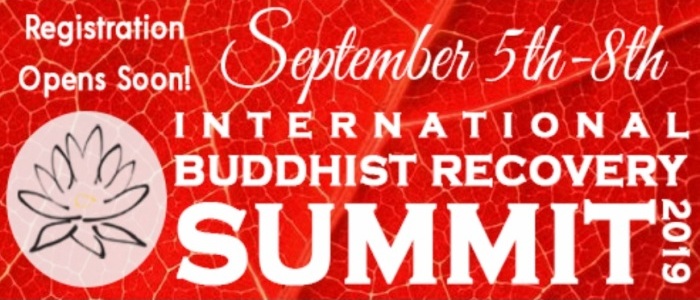Recovery – What’s Buddhism Got To Do With It?

Published on the Buddhist Recovery Network
The Buddhist Recovery Network (BRN) will be hosting its next summit in Lacey, Washington September 5-8, 2019. The title of this year’s summit is:
Recovery: What’s Buddhism Got to Do With It?
Come join us at the intersection of Buddhist practice and recovery from addiction. The summit will be a global gathering of teachers, authors, healers, meeting facilitators and practitioners. All recovery paths and Buddhist lineages are welcome.
During the 4-day retreat, we will engage in presentations, group discussion and sharing, practice, networking, collaborating and much more. Some of the topics for this year’s summit include:
- Addressing trauma and creating safe spaces in our sanghas and in the “rooms.”
- Early Buddhist teachings on addiction and recovery. Using stories and suttas from the Pali Canon to address modern challenges.
- Review and experience the many formats for Buddhist Recovery meetings: Refuge Recovery, Heart of Recovery, Eight Step Recovery, 12-step focused, other.
- Buddhist Recovery past, present and future. Where do we go from here? How can the BRN help?
The Summit will be held at the Gwinwood Retreat Center in Lacey Washington (site of the 2017 summit). Sitting on 29-acres, Gwinwood features 18 acres of forested land, 4 acres of open meadows and 7 acres of undisturbed wetlands, all fronting beautiful Hicks Lake. The summit fee will include accommodations and vegetarian meals.
For more information and to register, send an email to contact@buddhistrecovery.org.
AA Agnostica has been publishing articles about Buddhism and recovery since its earliest days. Here are some of them:
Mindfulness and the 12 Steps (2 September 2012)
A Buddhist’s Views on AA (4 August 2013)
Buddhism and the 12 Steps (16 July 2014)
AA as “Stealth Buddhism” (14 December 2014)
The Buddha and Bill W. (11 March 2015)
A Buddhist’s Path to Recovery (24 March 2016)
Buddhist Recovery Summit (6 August 2017)
The Little Book: A Collection of Alternative 12 Steps includes an interpretation of each of the Steps by Thérèse Jacobs-Stewart, a practitioner of Buddhism and the author of the book Mindfulness and the 12 Steps.

























I’m a music guy, so I love the title; very witty (darn, I wish I said that). I will examine my attachment to my feeling of awe and admiration. Anyway, this is an idea for it’s time… anything that might help those suffering who haven’t learned the Steps of other recovery dances.
For those of us who might not be able to go, I hope we get to hear all about it.
I belong to Lions Roar Dharma Center in Sacramento and it was their recovery program that reeled me in. 12 steps based on the 4 noble truths and 8 fold path. Lama Jinpa put this program together it helped me get over my obsession to drink along with AA. I no longer attend the recovery group as I am really busy with AA but it really helped me with AA’s step 11.
It’s been an interesting journey of discovering Buddhism within AA. AA’s society has rested on its laurels of a white Christian zeitgeist for so long I’m afraid it’s desire to reflect and consult methods recommended by the medical community to the hubris of heritage.
I’ve been sober for ten years thanks to an AA sponsor that introduced me to the eastern philosophies.
For several years I tried to have a group that compromised with fundamental members. But the end was polarized by backbiting intimidation by those same people. I’m afraid they’ve become the belligerent ones.
I’m currently investigating options of starting a Refuge Recovery Meeting in my area.
Most alcoholics have tried to quit drinking at some time. Perhaps many times. When I came to AA, I was SHOCKED at how religious it was, and still is. I went looking for other avenues, and there really wasn’t much available, even though I was in a large city. I was convinced that my solitary efforts had a short shelf life.
The reality, I think, is that people who find some resource, or resources, do much better than those just trying to do it all on their own. AA wouldn’t like to hear it, but there were many 19th Century groups where alcoholics helped each other to stay sober. There were NO 12 Steps, obviously. Some had a loose form of spirituality; some were secular. All had human connection. Those groups WORKED, but mostly disintegrated over political wrangling and the like.
I got Jack Trimpey’s book on Rational Recovery. Trimpey was a TERRIBLE group leader who raged on Phil Donahue when the audience asked tough questions. AA has the advantage of being ubiquitous and free. Some day, there will be a much greater variety of options. The change is happening now.
I am a Shin Buddhist. Seems all the Buddhist meetings and conferences are away from where I live, in the south bay area of Los Angeles. I just can’t find any Buddhist or non-theist meetings within a 10-mile radius of Torrance, California. If anyone can help me find a meeting (Santa Monica is too far – takes 45 minutes-hour by car) or form a new one, please contact me.